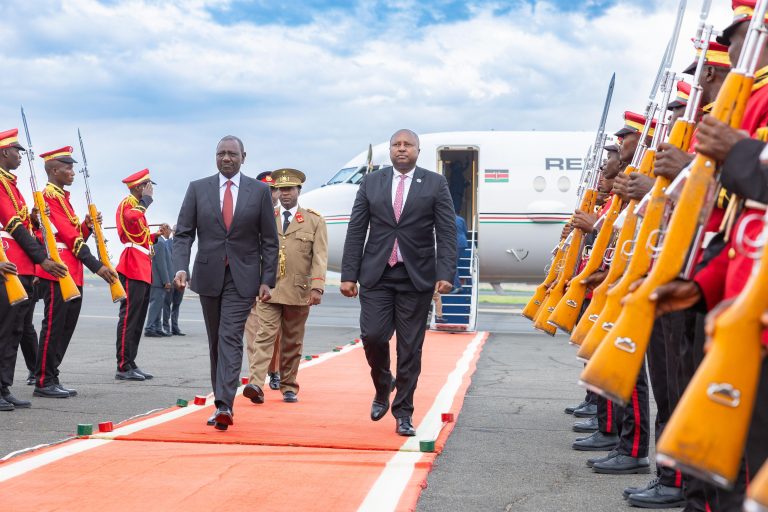
Ruto: African payment system will unlock continent’s trade potential
President William Ruto has asked Member States of the Common Market for Eastern and Southern Africa (COMESA) to ratify Pan- African Payments and Settlement System to enable and ease trade among the countries.
The President said the African payment system will save Africa more than $5 billion annually in payment and foreign exchange transaction costs.
“Instead of our traders chasing currency exchanges, they can be comfortably chasing trade initiatives,” President Ruto said.
He said there was a need to reduce transaction costs for goods and services, and thus boost trade among COMESA States.
President Ruto made the remarks during the 23rd COMESA Summit held in Bujumbura, Burundi, on Thursday.
He congratulated COMESA on the coming into force of the Tripartite Free Trade Area (TFTA) last July. He pointed out that this was a further step to harnessing the abundant potential of the African Continental Free Trade Area.
He commended Madagascar for being the latest COMESA Member State to ratify the TFTA.
At the same time, the President urged COMESA member countries to embrace reforms at the African Union.
He said AU must demonstrate seriousness in serving the more than 1.4 billion people in the continent.
“We must reform the AU to make it fit for purpose to serve the 1.4 billion citizens of the continent,” President Ruto said.
In this connection, President Ruto took the opportunity to campaign for Kenya’s candidate for the post of AU- Commission Chairperson Raila Odinga.
He described the former Prime Minister as the best candidate for the position.
“I want to take this opportunity to ask for your support on the position of the AU Commission chairperson. Mr Odinga is the best man for the job,” he said.
At the same time, President Ruto challenged COMESA Member States to put more effort to achieve regional integration and address the current challenges.
In the past 30 years, President Ruto said, COMESA has evolved to become a central institution for regional integration, mobility and economic transformation.
“We have liberalised trade, significantly increased exports and improved trade facilitation within the bloc. We have also cooperated on vital issues of peace, security and sustainable development,” he said.
He said the completion of projects such as the Northern Corridor and LAPSSET would enhance connectivity and promote efficiency in a wide range of value chains in different sectors throughout their catchment areas.
“Our progress notwithstanding, we live in a world that is constantly changing, and with it new opportunities and challenges,” President Ruto said.
The President said the evolution of global supply chains due to the adverse impact of climate change are realities that COMESA members face.
“The theme of this summit, therefore, ‘Accelerating Regional Integration Through Development of Value Chains in Climate-Resilient Agriculture, Mining and Tourism,’ speaks to our most strategic priorities in the pursuit of rapid growth and inclusive development,” he said.
He pointed out that with a population of 640 million and a GDP of $1 trillion, COMESA is Africa’s largest economic bloc, offering significant opportunities for growth in employment and wealth creation through industrialisation and innovation.
“However, significant opportunities exist to increase our share of intra-COMESA trade and further create opportunities for our farmers, traders and manufacturers,” he said.
At the same time, the President said there was no doubt that the region’s mineral resource endowments remain largely underutilised and poorly exploited.
“Mining still holds great potential to support industrialisation, employment and stronger export performance in our region,” he said.
For these reasons, President Ruto said Kenya is promoting responsible practices through initiatives like the IMKA Gold Project aimed at eliminating the use of mercury in artisanal mining and formalising the sub-sector to achieve and contribute to sustainable growth.
“Regional collaboration and integration of mining policies will enable COMESA attract investments while developing more robust environmental safeguards,” he said.
President Hakainde Hichilema of Zambia, who is the outgoing chairman of COMESA, said the trading bloc’s exports have increased from $100 billion in 2020 to $219 billion in 2024.
He said there was a need to embrace technology to enable farmers increase on their production.
“It’s through technology that our farmers can increase production and make our region food secure,” President Hichilema said.
Burundi President Evariste Ndayishimiye, the incoming chairman of COMESA, said the tourism sector and exploitation of mineral resources would empower the region’s economies.
He said opening regional markets would enable the free flow of goods and services.
“Integration of our region is no longer an option but a necessity if we are to empower our people economically,” he said.
Mr Ndayishimiye emphasised the need to resolve insecurity challenges facing Eastern DRC, Sudan and Somalia.
